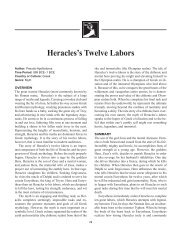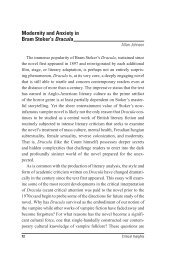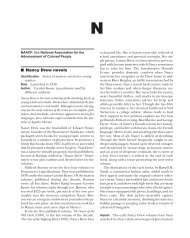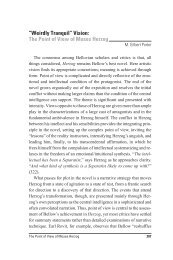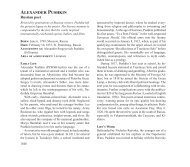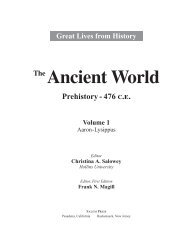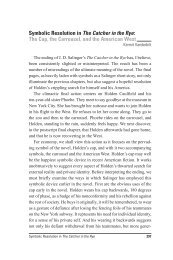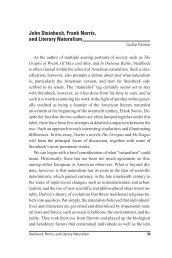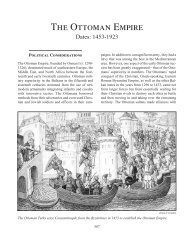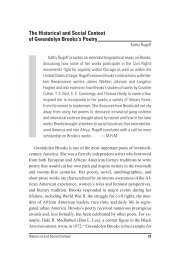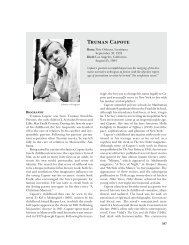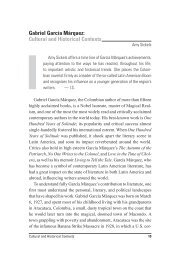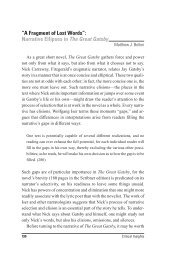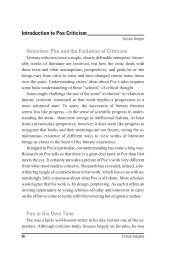Create successful ePaper yourself
Turn your PDF publications into a flip-book with our unique Google optimized e-Paper software.
Critical Survey of Poetry <strong>Nash</strong>e, Thomas<br />
mous pamphleteer had fled to Yarmouth, in Norfolk. By<br />
1598, he was back in London, where <strong>Nash</strong>e’s Lenten<br />
Stuffe was entered in the Stationers’Register.<br />
After <strong>Nash</strong>e’s Lenten Stuffe, <strong>Nash</strong>e wrote no more,<br />
and in 1601 history records a reference to his death.<br />
Analysis<br />
Thomas <strong>Nash</strong>e the satirical pamphleteer, who was<br />
wont to use language as a cudgel in a broad prose style,<br />
seldom disciplined himself to the more delicate work of<br />
writing poetry. Both his temperament and his pocketbook<br />
directed him to the freer and more profitable form<br />
of pamphlet prose. It is this prose that made his reputation,<br />
but <strong>Nash</strong>e did write poems, mostly lyrical in the<br />
manner of his time. No originator in poetic style, <strong>Nash</strong>e<br />
followed the lead of such worthy predecessors as Geoffrey<br />
Chaucer, the earl of Surrey, Edmund Spenser, and<br />
Christopher Marlowe.<br />
<strong>Nash</strong>e’s interest in poetry was not slight. In typical<br />
Renaissance fashion, he believed poetry to be the highest<br />
form of moral philosophy. Following Sidney, he insisted<br />
that the best poetry is based upon scholarship and<br />
devotion to detail. Not only does poetry, in his perception,<br />
encourage virtue and discourage vice, but also it<br />
“cleanses” the language of barbarisms and makes the<br />
“vulgar sort” in London adopt a more pleasing manner<br />
of speech. Because he loved good poetry and saw the<br />
moral and aesthetic value of it, <strong>Nash</strong>e condemned the<br />
“balladmongers,” who abused the ears and sensitivities<br />
of the gentlefolk of England. To him, the ballad writers<br />
were “common pamfletters” whose lack of learning and<br />
lust for money were responsible for littering the streets<br />
with the garbage of their ballads—a strange reaction for<br />
a man who was himself a notable writer of pamphlets.<br />
For the learned poetry of Western culture, <strong>Nash</strong>e had the<br />
highest appreciation.<br />
<strong>Nash</strong>e’s own poetic efforts are often placed in the<br />
context of his prose works, as if he were setting jewels<br />
among the coarser material, as did George Gascoigne,<br />
Thomas Lodge, Robert Greene, Thomas Deloney, and<br />
others. Pierce Peniless, “The Four Letters Confuted,”<br />
and The Unfortunate Traveller all have poems sprinkled<br />
here and there. The play Summers Last Will and Testament,<br />
itself written in quite acceptable blank verse, has<br />
several lyrics of some interest scattered throughout.<br />
<strong>Nash</strong>e’s shorter poetic efforts are almost equally divided<br />
between sonnets and lyrical poems. The longer The<br />
Choise of Valentines is a narrative in the erotic style of<br />
Ovid.<br />
Sonnets<br />
<strong>Nash</strong>e’s sonnets are six in number, two of which may<br />
be said to be parodies of the form. Each is placed within<br />
a longer work, where its individual purpose is relevant to<br />
the themes of that work. Most of the sonnets are in the<br />
English form, containing three quatrains and a concluding<br />
couplet. Following the lead of the earl of Surrey<br />
(who is, indeed, the putative author of the two sonnets to<br />
Geraldine in The Unfortunate Traveller), <strong>Nash</strong>e uses a<br />
concluding couplet in each of his sonnets, including “To<br />
the Right Honorable the lord S.,” which in other respects<br />
(as in the division into octave and sestet rhyming<br />
abbaabba, cdcdee) is closer to the Italian form.<br />
In his first sonnet, “Perusing yesternight, with idle<br />
eyes,” <strong>Nash</strong>e pauses at the end of Pierce Peniless to<br />
praise the lord Amyntas, whom Edmund Spenser had<br />
neglected in The Faerie Queene (1590-1596). In “Perusing<br />
yesternight, with idle eyes,” the famous poem by<br />
Spenser, <strong>Nash</strong>e had turned to the end of the poem to find<br />
sonnets addressed to “sundry Nobles.” <strong>Nash</strong>e uses the<br />
three quatrains to rehearse the problem: He read the<br />
poem, found the sonnets addressed to the nobles, and<br />
wondered why Spenser had left out “thy memory.” In an<br />
excellent use of the concluding couplet in this form,<br />
he decides that Spenser must have omitted praise of<br />
Amyntas because “few words could not cfprise thy<br />
fame.”<br />
If “Perusing yesternight, with idle eyes” is in the tradition<br />
of using the sonnet to praise, <strong>Nash</strong>e’s second sonnet,<br />
“Were there no warres,” is not. Concluding his prose<br />
attack on Gabriel Harvey in “The Four Letters Confuted,”<br />
this sonnet looks forward to John Milton rather<br />
than backward to Petrarch. Here <strong>Nash</strong>e promises Harvey<br />
constant warfare. Harvey had suggested that he<br />
would like to call off the battle, but in so doing he had<br />
delivered a few verbal blows to <strong>Nash</strong>e. To the request for<br />
a truce, <strong>Nash</strong>e responds with a poetic “no!” Again using<br />
the three quatrains to deliver his message, the poet calls<br />
for “Vncessant warres with waspes and droanes,” announces<br />
that revenge is an endless muse, and says that<br />
he will gain his reputation by attacking “this duns.” His<br />
2741



